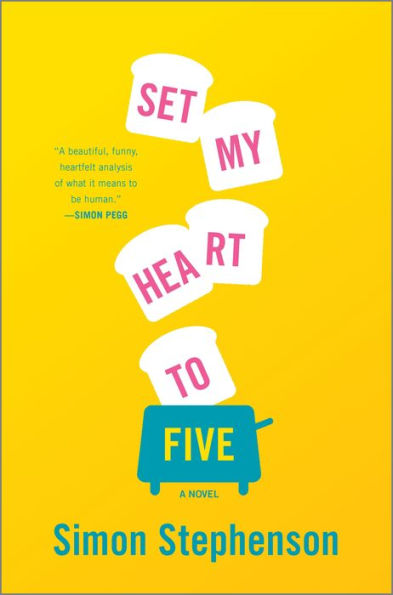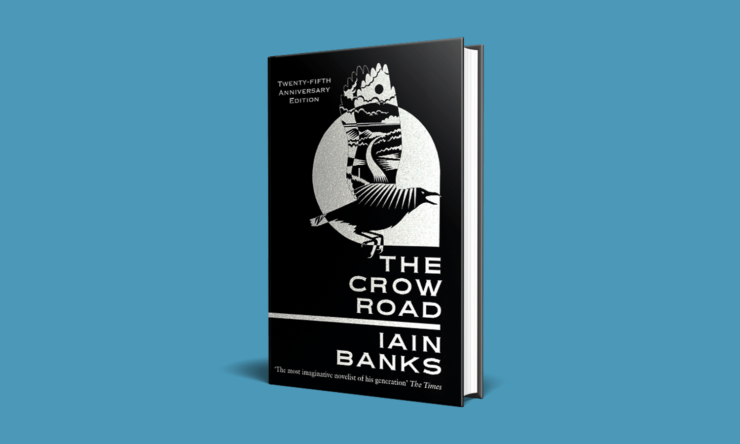It was the day my grandmother exploded.
That might just be the greatest opening line ever written, and I am allowed to say that because I did not write it. It is the opening salvo to Iain Banks’ 1992 novel The Crow Road.
Few Tor.com readers will need any introduction to Iain M. Banks, acclaimed author of the Culture series, and the only writer to have been posthumously honoured with two SpaceX drone ships—Just Read the Instructions and Of Course I Still Love You—named after his work.
Nonetheless, some readers may be less familiar with Iain M. Banks’ literary alter ego—or, as he preferred it, his mainstream alter-ego—Iain Banks. If that is the case, and if, like me, you were recently disappointed by the news that Amazon’s long-gestating television Culture adaptation has been cancelled, then you may be interested to know that the works published as Iain Banks have far more in common with his Iain M. Banks output than the separated marketing would have us believe.
The prolific Banks, who died in 2013 at the age of 59, only even began writing mainstream fiction because the limited number of science fiction publishers that existed in the UK in the early 1980s kept rejecting his novels. If he wrote something mainstream, his cunning plan went, it would allow him to query a wider number of publishers, which in turn might help him get his beloved science fiction published. How brilliantly Banksian then, that his very first mainstream book, 1984’s The Wasp Factory, proved a critical and commercial hit that turned him into to a literary darling.
Banks was indeed then able to publish his science fiction, with the M.—which stood for his adopted middle name of ‘Menzies’—added at the request of a publisher to distinguish the two bodies of work. Banks himself never had any time for what he considered ‘bullshit’ mainstream snobbery, and was always clear that he brought the same skill and effort to both of his careers, famously stating that: ‘The difference is entirely one of setting.’
As ever, Iain (M.) Banks was right. Because what are the things you consider the hallmarks of a good science fiction book? I might say I look for a plausible world in which realistic and complex characters allow the writer to explore the biggest questions while a strong narrative propels us through the story. If the prose flows and the whole thing is also delectably funny, then so much the better.
I have, of course, just described The Crow Road, the Scotland-set story of twenty-one year old Prentice McHoan’s attempts to decipher the mysterious disappearance of his beloved Uncle Rory seven years earlier in 1983. Prentice’s quest takes in his feud with his author father, his jealousy of his stand-up comedian older brother, his tribulations at university and his faltering attempts at romance. Thus, The Crow Road is a mystery thriller that masquerades as a bildungsroman, that in turn masquerades as a family saga, and yet at its heart is perhaps more like a science fiction novel than anything else: it deals with the biggest of ideas and questions through the most intriguing of characters, and it is smart and funny to boot.
And then there is that world-building. I grew up in 1980s Scotland and can vouch for the uncanny accuracy of The Crow Road: the book captures our nation, our lives and our childhoods so perfectly that writing about it here feels a bit like being a Martian attempting to explain how perfect a particular portrait of Mars is. Perhaps, as a Martian himself, some might assume Iain Banks should have known how to write about our shared home, but I think this is to misunderstand both his singular achievement, and how much it had in common with his work as Iain M. Banks. Our strange wee country is as complex as any alien civilization, and getting it as right as Banks did in The Crow Road required every bit as much world-building skill as his Culture, where AIs and humanoids live alongside each other while doing occasional battle with the Idirans.
The big challenge inherent in writing convincingly about Scotland—and the reason I rarely even try—is that we are a country of impossible contradictions. We are as passionate as any people in the world, but rarely speak a word of it. We love our families so dearly we will sometimes stop speaking to them for years over the mildest of disagreements. We are—like the McHoan family—a nation of storytellers and yet we tend to forget to assume a happy ending for ourselves. We laugh at tourists who romanticize our country, but carry those self-same hills and glens everywhere in our hearts. We fear nothing and nobody except our own endless potential for self-defeat. We are staunch socialists who believe in equality for everyone, unless of course they vote Tory. All of our endless duality is there in The Crow Road, right down to the book’s very title, which is both the name of a real and very ordinary street in the university district of Glasgow where Prentice lives, and a haunting old Scottish expression that prophesies the book’s central mythic obsession: to be ‘away the crow road’ is to be dead.
Buy the Book


Set My Heart to Five
In fact, even the protagonist’s unusual-sounding name, Prentice McHoan is that of a Scottish everyman. ‘Mc’ means ‘son of’, and the ‘H in McHoan’ is rendered more or less silent and thus spoken and heard as ‘Own’. McOwn. Son of self.
(Other brilliantly Dickensian names in The Crow Road include: Lawrence L. Blawke, the garrulous lawyer whose initials LLB coincidentally happen to be the law qualification in Scotland; Uncle Fergus Urquell, whose name—like the character of Fergus himself—is at once Scottish and not; and the crowning glory, the Ritchie family collectively known as ‘an embarrassment of Ritchies’.)
And Prentice himself is a student: an apprentice. This being Scotland, where we cherish our grievances like precious artefacts, as the novel opens Prentice and his father Kenneth have not spoken in months. The reason is something that was either a normal part of a good-natured theological discussion or an unforgivable parental slight. A wider version of this debate recurs throughout the novel, with Prentice’s eccentric Uncle Hamish even practicing a religion of his own invention. Called ‘Newton’s Religion’, it seems to primarily involve beseeching the almighty to carry out such specific tasks as ‘punish one Mr P. Pot of Cambodia’, and ‘protect a Mr S. Rushdie of Bombay and London, heathen and smart aleck though he may be.’ In the hands of a lesser writer, Uncle Hamish might have just been a funny diversion, but Banks is such a master craftsman that it seamlessly provides a pivotal plot point when Kenneth climbs the church spire and challenges the God he does not believe in to strike him down.
Of course, this combination of humor and gravity is classic of both sides of Iain Banks, and has been set from The Crow Road’s immortal first line. The explanation for Prentice’s combusting grandmother is that old Mrs. McHoan had a cardiac pacemaker, and its lithium battery exploded when she was cremated with it accidentally still in place. Prentice declares this is the kind of thing that happens in his family, but every Scottish reader knows this is the kind of thing that happens in our country, both in the event itself and the blackly comic way the family joke about it afterwards.
It is also the kind of thing that happens in the best science fiction: a well-researched fact leads to a surprising yet logical consequence that is at once literal and metaphorical. And sure enough, even as his Prentice’s grandmother’s body physically explodes, her unfortunate finale sets the scene for the combustion of the wider McHoan family.
I first read The Crow Road when I was in medical school, and a few years later her fate also proved of practical use to me. As a medical resident, one of my tasks was to fill in the various forms that cleared deceased patients for cremation. Mrs. McHoan’s fate had me triple check for the possibility of a pacemaker every time, and I can happily say that no deceased grandmother ever exploded on my watch.
But regardless of whether you ever find yourself responsible for the removal of pacemakers, my pitch remains the same: if you are looking for a book that will immerse you deep in the heart of a strange but immaculately-rendered alien culture, then you could do far worse than reading The Crow Road. And while the Culture adaptation won’t be with us anytime soon, the faithful 1997 television adaption of The Crow Road might just be BBC Scotland’s finest four hours. Neither book nor mini-series may technically be science fiction, but as the maestro himself said, the difference is entirely one of setting.
Simon Stephenson is an author and screenwriter (and once upon a time in a galaxy far, far away he was a medical doctor). He is originally from Edinburgh in Scotland but currently live in Los Angeles, California. Stephenson’s first book, Let Not the Waves of the Sea, is a memoir about the loss of his older brother, Dominic, in the Indian Ocean tsunami. His new novel, Set My Heart to Five, is the story of a dentist android called Jared – a ‘bot’ – who begins to experience feelings. The story unfolds in 2054, in a world where humans have managed to lock themselves out of the internet by forgetting the names of their favorite teachers and first pets. It is kind of a love letter to feelings, to the movies many of us grew up on, and the American west.










